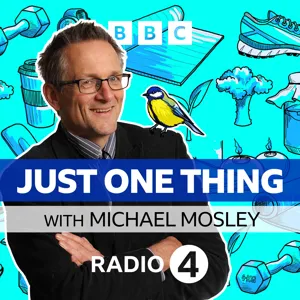Podcast Summary
Boost mood and improve health with a morning walk: Walking briskly each morning can enhance mood, better sleep, and lower risk of heart disease and diabetes, while exposure to natural light can combat conditions like SAD.
Incorporating a brisk morning walk into your daily routine could significantly improve your mental and physical health. This simple act can boost your mood, enhance your sleep quality, and potentially reduce the risk of heart disease and diabetes. The benefits go beyond physical activity, as natural light exposure during your walk can help combat conditions like seasonal affective disorder. It's a quick, easy, and effective change that can make a noticeable difference in your overall well-being. So, consider making time for a brisk morning walk each day to reap these numerous benefits.
Walking in the morning improves sleep quality: Walking within 2 hours of waking up exposes you to bright light, resets your internal clock, suppresses melatonin production, and improves sleep hygiene.
Walking in the morning, specifically within 2 hours of waking up, can significantly improve sleep quality and overall well-being. This is because exposure to bright morning light helps reset the internal body clock, suppresses melatonin production, and makes the body more prepared for sleep at night. Additionally, even if you're not an early riser, going for a walk during daylight hours, especially when the sun is rising, can still have positive effects on your body clock and sleep patterns. It's a simple trick that can help train yourself to become a morning person and improve overall sleep hygiene. Furthermore, during winter months with shorter days, it's crucial to effectively reset your body clock in the morning to avoid feeling tired and groggy.
Brisk walking boosts mood and protects heart: Brisk walking releases mood-boosting chemicals and reduces risk of cardiovascular disease by up to 20%
Incorporating brisk walking into your daily routine can significantly improve your overall health and well-being. When you walk faster, your body releases serotonin, a natural mood booster and chemical that antidepressants also target. This can help reset your brain chemistry and improve your outlook. According to a large study conducted by Marie Murphy and her team at Ulster University, brisk walking offers greater protection against cardiovascular disease than walking at a slower pace. The study found that doing 30 minutes of brisk walking every day, or breaking it up into shorter walks throughout the day, can reduce your risk of cardiovascular disease by up to 20%. This simple change in your daily routine can lead to substantial health benefits, making it a worthwhile investment in your overall well-being.
Incorporating short brisk walks into daily routine: Brisk walks 2-3x/day boost circulation & cognitive function. Walk pace should be brisk but comfortable, with a consistent beat for maintenance. Any walking, before or after breakfast, is beneficial. Aim for 10,000 steps daily to monitor activity.
Incorporating short, brisk walks into your daily routine, ideally 2-3 times a day, can significantly benefit your circulation and cognitive function. These walks should be brisk enough to make you feel your heart beating, warmer than usual, and breathing faster than normal, but still comfortable enough to carry on a conversation. The optimal pace can vary from person to person, and music with a consistent beat can help maintain a brisk walking speed. There is no definitive answer to whether walking before or after breakfast is better, as the evidence is mixed. However, walking after breakfast may help turn on muscles and draw fat and sugar out of the blood. The most important message is that any walking, regardless of the time of day, is beneficial. Aiming for 10,000 steps a day is a useful metric to help monitor physical activity.
Start your day with a brisk morning walk: A brisk morning walk exposes you to early light, boosts mood, increases lifespan, and provides a natural mood booster
Incorporating a brisk morning walk into your daily routine can bring numerous benefits to your overall well-being. This simple act exposes you to early morning light, which can help improve your sleep and even make you a morning person. Additionally, the physical activity involved in walking briskly can help boost your mood and potentially increase your lifespan. So, next time you're considering hitting the snooze button, think about the positive impact a brisk morning walk could have on your day and your life. Plus, the peaceful and calming environment of an early morning walk can provide a natural mood booster, leaving you feeling more alert and energized throughout the day. So, grab your shoes, step outside, and enjoy the many benefits of a brisk morning walk.
Shop ethical and affordable jet setting essentials at Quince: Quince offers high-quality jet setting essentials at affordable prices with ethical manufacturing practices, free shipping, and 365-day returns.
Quinn's offers high-quality jet setting essentials at affordable prices. From European linen to premium luggage, Italian leather bags, and more, Quinn's has it all. And the best part? These items are priced at 50 to 80% less than similar brands. But it's not just about the savings – Quinn's also ensures ethical manufacturing practices are used. So, when packing for your next getaway, consider Quince for your essentials. Not only will you look great, but you'll also feel good knowing you're supporting safe and ethical practices. Plus, enjoy free shipping and 365-day returns when you shop at quints.com/pack.





